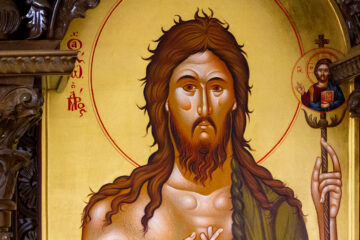Archimandrite Georgios Kapsanis, Abbot of the Holy Monastery of Gregoriou †
After his rebuke to Peter, the Lord asked of his disciples that they, too, should lead their lives bearing a cross. He says that those who wish to follow him must deny themselves, take up their cross and follow him (Matth. 16, 24).
To the sons of Zebedee and their mother who’d asked for them to be seated next to him, Christ answered: ‘You do not know what you are asking. Can you drink the cup I am going to drink, and to be baptized with the baptism I am baptized with?’ (Matth. 20, 20). It’s clear from these words of the Lord’s that Christ suffered for us to leave us an example so that we might follow in his footsteps (see 1 Peter, 2, 21).
The cross isn’t merely the ‘prefiguration’ or the ‘symbol’ or the ‘sign’ of Christ, it’s also a way of life for Christians, or rather it’s the way of life for Christians.
Just as the true Christ can’t be contemplated without the cross, so it’s inconceivable for there to be a true Christian without a cross, that is participation in the cross of Christ. As the Savior himself tells us, those who don’t take up their cross and follow him can’t be his disciples (Luke 14, 27).
But what does it mean to follow Christ and bear my cross, that is to experience the cross in my life?
Those who belong to Christ crucify the flesh with the passions and the desires (Gal. 5, 24). I deny my former self and strive to root out from within me egocentrism, love of self and the sinful and egotistical passions.
Forms of love of self are: little faith or no faith at all; indifference towards others and even worse, exploitation of them; hedonism and carnality; greed and avarice; malice and slander, as well as any action which wounds and distresses other people; ambition and vainglory.
According to the holy Fathers, if you love yourself, you can’t love God and you can’t love other people. You may pretend to do so but deep down you love only yourself and with an unhealthy love at that.
Unless we crucify our love of self with Christ’s cross, we can’t be real disciples of his, because we can’t acquire his own, genuine love.
This is why Saint Paul, the imitator of Christ, says: ‘May I never boast of anything except the cross of our Lord Jesus Christ, through which the world has been crucified to me, and I to the world’ (Gal. 6, 3-4).
According to Saint Isaac, ‘the world’ is our acrimonious relationship with the world, that is our passions. So, ‘the world has been crucified to me and I to the world’ means that I avoid not only sins themselves, but also sinful desires, and sinful thoughts.
We can achieve this mortification because sacramentally we’ve died with Christ and risen with him. ‘As many as have been baptized into Christ, have been baptized into his death’, and so we’re able to walk ‘in newness of life’ (Rom. 6, 3-4).
Within our dead life, through holy baptism we’ve been granted the new life in Christ.
After baptism, the Christian life becomes the struggle to make the ‘potential’ into ‘action’. A struggle for our regenerated new life of Christ bestowed upon us to triumph and to transform every element of our dead and former self. This struggle is the cross.
Source: pemptousia.com



0 Comments